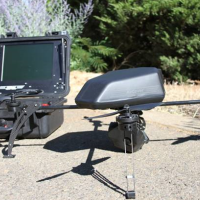Rebuffed Alameda County Sheriff Buys Two Drones Anyway
 AirCover QR425 drone
AirCover QR425 drone
Alameda County Sheriff Greg Ahern reluctantly bowed to public pressure and objections from the Board of Supervisors last year when he withdrew his proposal to buy two drones, partially with county money, amid concerns about surveillance, safety and civil liberties.
Then he waited a few months and bought them on the sly. It was a lot less messy. Instead of asking, in a public venue, for county general funds and a U.S. Department of Homeland Security grant, he unilaterally took the entire $96,000 out of a separate source, the county’s Office of Homeland Security and Emergency Services.
Ahern made the announcement Wednesday, the day after officially securing the purchase of two AirCover QuadRotor QR425s.
It was a surprise to groups like the American Civil Liberties Union (ACLU) and the Electronic Frontier Foundation (EFF), privacy advocates that were active in stopping the purchase in February 2013. They tried working with the sheriff’s office early last year to craft a drone policy that would protect privacy. Their work was not completed.
“He's acquired this drone in secret over public opposition,” ACLU staff attorney Linda Lye told the Oakland Tribune. “He is basically asking for a blank check, but when it comes to our privacy rights we deserve more meaningful safeguards.”
EFF activist Nadia Kayyali told Ars Technica, “The Sheriff has done nothing to address the concerns expressed by the community at the February 2013 hearing,”
Ahern said the drones will only be used for emergencies, like search-and-rescue missions and bomb squad operations. He told the Tribune he had made it clear that he was going to buy the drones one way or another.
Civil libertarians have raised questions about privacy issues related to surveillance from the sky while commercial pilots and airlines maintain that drones pose a serious potential threat to aviation. There is currently a general lack of federal oversight and no systems in place to integrate the drones into existing air traffic control operations. Federal officials are still debating how to regulate them.
Los Angeles and San Jose police departments have also recently acquired drones, but neither has used them. They all need certificates of authorization from the Federal Aviation Administration (FAA) before they can use them.
Drones are just part of a national reconfiguration of local police departments as paramilitary operations equipped with high-tech gear and weaponry supplied by the federal government. One U.S. Department of Defense program has funneled at least $35 billion worth of equipment to local law enforcement agencies, although drones aren’t part of that.
At last count, that program had dispersed 93,763 assault weapons, 180,718 magazines of ammunition, 44,900 night vision goggles, 533 aircraft, 432 armored mine-resistant vehicles and 435 other armored vehicles.
What’s another drone or two?
–Ken Broder
To Learn More:
Alameda County Sheriff Buys Two Drones (by Matt O'Brien, Oakland Tribune)
Alameda County Sheriff Reveals That He’s Bought 2 Drones (by Henry K. Lee, San Francisco Chronicle)
County Sheriff Finally Gets the Drone He Wanted, Ignores Privacy Concerns (by Cyrus Farivar, Ars Technica)
Can’t Get Public Approval to Buy a Drone? Do It in Private! (by Nadia Kayyali, Electronic Frontier Foundation)
Alameda County Sheriff Wants to Be First in State to Have Very Own Drone (by Ken Broder, AllGov California)
The Militarization of Local Police: California Edition (by Ken Broder, AllGov California)
- Top Stories
- Controversies
- Where is the Money Going?
- California and the Nation
- Appointments and Resignations
- Unusual News
- Latest News
- California Forbids U.S. Immigration Agents from Pretending to be Police
- California Lawmakers Urged to Strip “Self-Dealing” Tax Board of Its Duties
- Big Oil’s Grip on California
- Santa Cruz Police See Homeland Security Betrayal in Use of Gang Roundup as Cover for Immigration Raid
- Oil Companies Face Deadline to Stop Polluting California Groundwater





